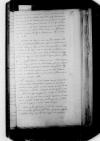Letter #5786
Alfonso de VALDÉS to Ioannes DANTISCUS[Brussels?], [1531, autumn?]
English register:
Valdés discusses the details of the dinner planned in Dantiscus’ garden for the next day – he informs Dantiscus that he will be there himself, as well as Barrensis [Esteban Gabriel Merino?], while Cobos(?) has made the excuse that the limits of moderation are always exceeded at Dantiscus’, while he prefers to do this eating meat and not fish.
Manuscript sources:
Auxiliary sources:
Prints:
| ||||||||||||||||
Text & apparatus & commentaryPlain textText & commentaryText & apparatus
Salutem.
Egi apud probably
ms 1 nobis⌈nobiscumms 2 nobiscum,
ms 1 nobis⌉
ms 1 (si fieri potest),
ms 2 si fieri potest⌈(si fieri potest)ms 1 (si fieri potest),
ms 2 si fieri potest⌉
adducamus, sin autem, ipsi veniemus.
Vale.

 BK 222, No. 48, p. 190
BK 222, No. 48, p. 190